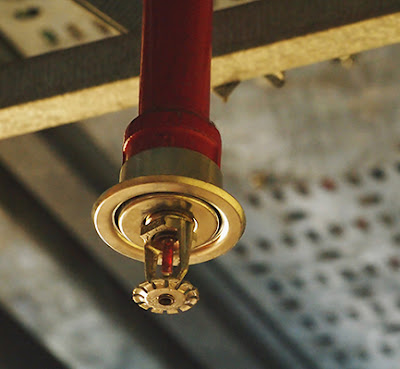A fire sprinkler system is one of the most important fire fighting equipment that is designed to effectively and quickly battle the fire triangle. They control or eliminate the heat source, thus preventing a fire incident from converting into a disastrous accident. A fire sprinkler system installation in your building is activated automatically when the room temperature increases enough to trigger the heat-sensitive element in one of the sprinkler heads.
Some of the advantages of a fire sprinkler system
Triggers automatically within the first few minutes of a fire breaking out without human intervention
Also automatically sends an alert to the local fire department
Reduces the production of smoke and limiting the spread of flames
Limits property damage
Protects the occupants
Usually reduces insurance premiums for properties that have a well-maintained sprinkler system
Since fire can be classified into different categories depending on the agent that fuels them, there are different types of fire sprinkler systems available to deal with specific fire categories.
Wet pipe systems
Wet pipe sprinkler systems are one of the most common types of sprinkler systems. These types of systems use water to combat a fire. Thus, they are simple and reliable. Moreover, a wet pipe fire sprinkler system’s maintenance is usually low. However, buildings using wet pipe systems must maintain a temperature of at least 40 years to prevent the water in the pipes from freezing during the colder months. They are most commonly used in schools, office buildings, and high-rise buildings with ordinary hazards.
Dry Pipe systems
These are the second most commonly used types of sprinkler systems. Unlike wet pipe systems, they use pressurized air or nitrogen to fight a fire. They are often used in unheated buildings such as parking garages. If there is a sudden increase in the temperature of the room, the sprinkler system is activated and drops the air pressure in the system.
Foam water sprinkler system
This type of sprinkler system contains a mixture of foam and water concentrate to deal with fire. They are often installed in areas where there can be a case of high-challenge fire accidents like fires caused by flammable liquids.
Deluge systems
Deluge systems have open sprinkler heads that discharge water quickly in case of a fire emergency. They are most commonly used in high-hazard buildings. Moreover, unlike other types of sprinkler systems, the sprinkler heads in deluge systems always remain open and all are activated at once.
Pre-action systems
These are hybrid fire sprinkler systems that make use of the complexity of dry pipe systems and the flexibility of wet pipe systems. However, they are expensive to install and demand high maintenance. They are often used in buildings such as data centers, museums, and libraries.
Remember, while it’s important to know the different types of fire sprinkler systems, the fire sprinkler system inspection, installation, and maintenance should always be handled by a certified and trained professional.

